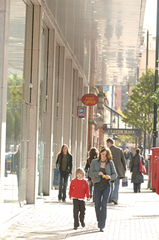Welfare reform to be adapted for families
 MLAs have made proposals to protect children and families from cuts in welfare spending but more radical changes are being ruled out to avoid breaking parity.
MLAs have made proposals to protect children and families from cuts in welfare spending but more radical changes are being ruled out to avoid breaking parity.
The Assembly’s ad hoc committee on welfare reform has made several suggestions to protect families from the effects of the changes. The committee was set up to consider the equality and human rights implications of welfare reform and took evidence from several charities and oversight bodies.
Chief Equality Commissioner Michael Wardlow pointed out that the Bill cannot pass an ‘equality and human rights test’ as none exists but MLAs can identify potential areas which can be improved. The report therefore focuses on making small improvements to help specific groups.
The committee said that treating the “parent with care” as the nominated claimant, for receiving payments, was the best option. Paying universal credit on a bi-monthly basis, it says, should also minimise any potential adverse impacts on women and children.
The Department for Social Development had given assurances that lone parents will not be penalised for the shortage of affordable and accessible childcare. The committee called on the department to monitor sanctions against lone parents.
Most committee members voted in favour of a benefit cap (£26,000 net per annum and £35,000 before tax) as they believed that this would have no human rights or equality implications. Sinn Féin and the SDLP contended that a benefit cap at this level would put larger families at a disadvantage.
The so-called ‘bedroom tax’ would penalise households which have more bedrooms than residents, and this would also have implications for families. A parent separated from their spouse may keep a bedroom free so that a child can stay over when visiting.
Families in Northern Ireland may be unable to find smaller dwellings due to segregation and inadequate stock. The level of housing unfitness increased, for the first time in forty years, from 2.4 per cent in 2009 to 4.6 per cent in 2011.
The committee asked the department to take exceptional circumstances, such as joint custody, into account. It recommended a further exemption for foster carers who need to keep rooms free at short notice.
The committee’s Chairman, Alliance MLA Trevor Lunn, commented: “The fact is that not everyone will be happy with the outcomes of welfare reform but we are striving to ensure that no group in our society is disadvantaged.”
“The report presented to the Assembly did not reflect [interest groups’] opinions in a strong enough manner for us to support,” said Sinn Féin MLA Mickey Brady. SDLP MLA Colum Eastwood said that the report did not go far enough and claimed that welfare reform would have “a devastating impact on the most vulnerable people including women, children and the disabled.”
UUP representative Tom Elliott said that his party tried its best to “establish the facts around equality and human rights.” DUP MLA Lord Morrow concluded that the process was “a waste of time” as the committee’s work overlapped with the Social Development Committee, which will be bringing forward its own report.
He defended parity as being in Northern Ireland’s interests. “I suspect that, if you were to drill down very deeply into this, you would find that all of us around this House would not want it any other way,” he remarked. “If we do make it different, the people we claim we are trying to help will be disadvantaged very severely.”
The Social Development Committee’s report was due to be published by 19 February. Social Development Minister Nelson McCausland hopes that the Bill will become law before the summer recess.





